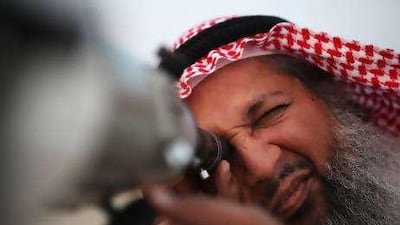DUBAI // From hilltops and desert sands, members of the Moon Sighting Committee scoured the skies for the first glimpse of the Ramadan moon. Today will be the first day of Ramadan, the committee announced last night. Few countries still rely on a local sighting to declare the start of the holy month, but every year on the 29th day of Sha'ban, the Islamic month preceding Ramadan, members of the committee still search for the new moon.
Hasan al Hariri, the head of the Dubai Astronomy Group, knew there was little chance of sighting it with the naked eye last night, but headed to the Dubai desert, set up his telescope and aimed it at the setting sun. "It's tradition and it's an order that we should observe, to go and look for the crescent," he said. "It sends the right message." The orb of orange began to slip below the horizon, casting its glow across the dunes. "This should be the perfect time," he said. "It's there, we just can't see it because it's too close to the sun. I'm trying my best but it's also very hazy."
Mr al Hariri and his team are one of more than 50 groups around the world reporting their findings to the Islamic Crescent Observation Project (IPOC). Saudi Arabia and the UAE have also encouraged members of the public to participate by reporting their own moon sightings. "This can lead to some mistakes," he said. "If people want to see it then they will." Mr al Hariri sent a text message to the project's representative in Qatar updating on the situation in the UAE: "Status: Not seen. Weather conditions: Hazy." He pulled out a GPS device that can tell the position of the moon from the signals of 12 satellites.
"We know from scientific calculations it was above the horizon but it's probably too late, it might have gone by now," he said, raising the device to his eye. The new moon is not usually visible after dark as it sets shortly after the sun. He pointed excitedly to a sand dune ahead: "There it is! It's just below the dune."
After evening prayers senior judiciary officials, religious counsellors and astronomical society members met at the Abu Dhabi Justicial Department to discuss the findings of the observational teams.
"We are the scientists, we aren't the decision makers, the decision making is in the hands of the religious scholars," said Mr al Hariri. "There are several schools of thought. There are those who wait until they see it for sure, and others who use scientific calculations." Oman, Pakistan and India wait until the moon is visible with the naked eye.
Dr Omar al Saleh, a professor in fiqh (Islamic Jurisprudence) at the Sharjah College of Sharia and Islamic Studies, said at the time of the Prophet Mohammed there was no technology available, so Muslims were told to wait until they could see the crescent moon.
"However, Islam is based on convenience and following development, so now that there are other methods and Islam permits using them," he said. "So we follow the original instruction with a committee that goes to spot the crescent, but at the same time we use telescopes and science to calculate if the moon will show or not."
As Muslim countries are all part of one "ummah", or community, if a trusted member of the community sees the crescent anywhere in the world, Ramadan can be declared, he added.
"Even if they see it in another country, if they are trusted Muslims then we should take their word for it."
According to tradition, Ramadan begins when a credible witness gives a sworn statement that he saw the new moon during the hours of dusk.
However, Mr al Hariri, who has been coming out to spot the Ramadan moon for the past 20 years, said he preferred the traditional method, where the moon must be sighted locally.
"This is the most simple," he said. "If we can do it simply by eye then why don't we?"
The desert landscape is serene and still in the dusky light. Moon sighting positions are chosen for their distance from the city.
"It's quiet, away from the light pollution and with clear air," said Mr al Hariri. "One of the major problems for astronomy today is light pollution. In the city you can barely see a few stars, but in my childhood the sky was a really beautiful thing."
Mr al Hariri first fell in love with astronomy when his brother bought a book on the planets when he was a teenager.
"When you learn more the sky is no longer the same for you," he said. "The first time I looked up and see the different constellations it was so joyful. The skies are decoded."
But another draw to the field was its importance in Islam, making the Ramadan moon sighting particularly auspicious.
"It played a major part," he said. "Lots of verses of the Quran advise that we observe the sky."
For Mr al Hariri the first sighting of the moon brings fond memories of his childhood.
"When we were kids we'd be out on the streets seeing who could spot the moon, and if you saw it you would shout out 'I can see the moon!'," he said.
@Email:lmorris@thenational.ae
* With reporting by Haneen Dajani

